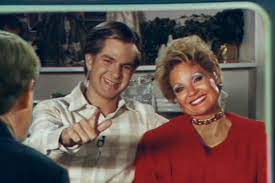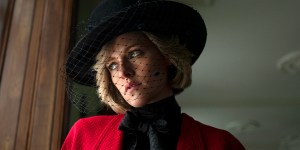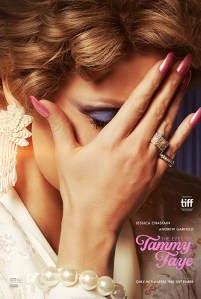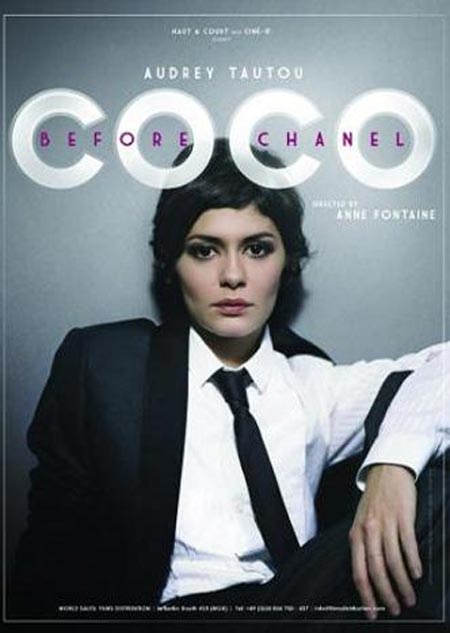The Rise and Fall of Female Celebrities: Films reviewed: The Eyes of Tammy Faye, France, Spencer
TIFF is almost over now, but there’s still one day left to see some films. And although there aren’t many famous people appearing on King St this year, there are a lot of movies about celebrities. How they rise to fame and how they are often brought down again by the voracious papparazzi-fueled press. So this week I’m looking at three TIFF movies — two biopics and one dramedy — about female celebrities who just want to be loved. There’s a newscaster in Paris who is part of the news; a princess in England who is part of the royals; and a televangelist who is the target of the mainstream press.
Dir: Michael Showalter
Tammy Faye (Jessica Chastaine) is a televangelist. Born in International Falls, Minn, a small town on the Canadian border, she is raised by a strict mother (Cherry Jones) who calls her a harlot. She is born again in a Pentecostal church where she is speaking in tongues at an early age. At bible college she meets her future husband, Jim Bakker (Andrew Garfield). He rejects the dour talk of sin and instead subscribes to a charismatic evangelism, one where all are welcome, regardless of belief or denomination. Wealth, not poverty, is desirable. Tammy loves his ideas and him. But she wears makeup and bright colours, and they end up in bed together and eventually married.
They are expelled from the school, but bounce back. Tammy makes an ugly little puppet out of a bubble bath container to attract kids to revival meetings. Their popularity takes off and before you know it, they’re regulars on Pat Robertson’s Christian TV show. They break away to form their own satellite-powered TV network, attracting viewers and followers worldwide — people who enthusiastically send tons of cash to keep the show going. Tammy’s songs hit the Christian music charts while Jim expands their financial holdings, opening theme parks and other ventures. Tammy and  Jim love the wealth and luxury their show brings in — the mink coats and fancy homes. Their sex life, however, takes a dive. Neglected by her husband, Tammy is attracted to handsome men — and, so it seems, is Jim. She turns to Ativan and Diet Coke to keep her engine running. But they’re facing trouble. The mainstream press exposes scandal after scandal. And lurking in the background is the Christian Right, led by the notorious Jerry Fallwell (Vincent D’Onofrio). Can their marriage last? Will their financial empire stay afloat? Will Tammy’s mom ever respect her? And will the people always love her?
Jim love the wealth and luxury their show brings in — the mink coats and fancy homes. Their sex life, however, takes a dive. Neglected by her husband, Tammy is attracted to handsome men — and, so it seems, is Jim. She turns to Ativan and Diet Coke to keep her engine running. But they’re facing trouble. The mainstream press exposes scandal after scandal. And lurking in the background is the Christian Right, led by the notorious Jerry Fallwell (Vincent D’Onofrio). Can their marriage last? Will their financial empire stay afloat? Will Tammy’s mom ever respect her? And will the people always love her?
 The Eyes of Tammy Faye is a stylized, tongue-in-cheek biopic about the rise and fall of a televangelical superstar. The title refers both to her gaudy false eyelashes as well as the trademark tears she could generate on command. Jessica Chastain creates an unforgettable character through the use of facial prosthetics and heavy-duty makeup as she ages. She mainly plays Tammy for the laughs — there’s a wide streak of camp running through the whole film — but there is some heart behind it. And on the serious side, it points out her advocacy of AIDS patients, just when Falwell was publicly attacking them. I quite enjoyed the movie, it’s a lot of fun with tons of flashy colour and splashy music. It’s clearly Oscar bait — this is Jessica Chastain looking for golden statues — but that doesn’t detract from the enjoyment of watching it.
The Eyes of Tammy Faye is a stylized, tongue-in-cheek biopic about the rise and fall of a televangelical superstar. The title refers both to her gaudy false eyelashes as well as the trademark tears she could generate on command. Jessica Chastain creates an unforgettable character through the use of facial prosthetics and heavy-duty makeup as she ages. She mainly plays Tammy for the laughs — there’s a wide streak of camp running through the whole film — but there is some heart behind it. And on the serious side, it points out her advocacy of AIDS patients, just when Falwell was publicly attacking them. I quite enjoyed the movie, it’s a lot of fun with tons of flashy colour and splashy music. It’s clearly Oscar bait — this is Jessica Chastain looking for golden statues — but that doesn’t detract from the enjoyment of watching it.
Wri/Dir: Bruno Dumont
France de Meurs (Léa Seydoux) is a TV news reporter in Paris like none other. One day she’s flying off to a war front in the Sahel, the next she’s mediating between two political commentators. She’s beautiful, talented and loved by millions. At a presidential press conference she can upstage Macron. Her husband Fred is a novelist, and they live with their son Jojo in a flat thats more of an art museum than a home. And with the constant help of Lou (Blanche Gardin), her assistant and manager, she navigates from one success to the next. She’s untouchable. Until something throws her off kilter. Her car, caught in traffic, accidentally bumps a young man on a motorbike hurting his leg. Baptiste is working class, the son of Algerians. France is mortified and goes out of her way to visit his family, showering them with gifts. But a deep-down depression has taken hold.
Her self confidence is fading and she’s prone to breaking into tears at the first provocation. Fred finally sends her to an alpine spa to recover, where she meets a guileless young man named Charles (Emanuele Arioli) who has never heard of her. Is he the answer to her prayers? Or just her latest obstacle as she falls deeper and deeper into her abyss?
France is a satirical dramedy about France (the country) its politics, celebrities and news media. Like the 1987 film Broadcast News it exposes the falsity and contrivedness of the news industry — their posing, re-shooting of answers in interviews, and the staging of news scenes during a war. But just as the film exposes the tricks and manipulation of reporting, Bruno  Dumont (the filmmaker himself) relies on his own contrived story. Poor France! She’s subject to Dumont’s morbidly humorous plot turns, inflicting more and more calamities on his poor hapless character. France de Meurs is Dumont’s Job.
Dumont (the filmmaker himself) relies on his own contrived story. Poor France! She’s subject to Dumont’s morbidly humorous plot turns, inflicting more and more calamities on his poor hapless character. France de Meurs is Dumont’s Job.
The film kept me interested all the way through, and Lea Seydoux is really good in her role as a manipulative but likeable celebrity, but it goes on way too long — one of those movies that feel like they’re about to end, but don’t.
Dir: Pablo Larraín
It’s Christmas Eve in 1990.
Princess Diana (Kristen Stewart) is late for lunch. She’s driving to Sandringham Castle and and has lost her way. She grew up on a country home nearby. Eventually she is rescued by Darren the palace chef (Sean Harris) who runs his kitchen like a military battalion. But Diana doesn’t want to be there. She hates the weird family traditions she’s forced to follow. Things like sitting on a scale when you enter to see how many pounds you’ll gain feasting over Christmas. Not much fun for someone with Bulimia. She dreads the clothes and jewels she’s forced to wear, and can’t stand the family dinners — she thinks the royals can all read her mind. Her only allies are her young sons William and Harry, with whom she can act like a normal mom; and her dresser and confident Maggie (Sally Hawkins) whom she can tell anything.
Why is she so distraught? Because she knows her husband is having an affair. The constant hounding by the dreaded cameramen is deadly, but even worse are the palace rules, enforced by a cryptic royal military officer. Major Alistar Gregory (Timothy Spall) feels it’s his duty to police everything she does — and she despises him for it. He sews her curtains shut — to stop the photographers, he says — and banishes Maggie from the castle. And as the three days around Christmas come to pass, her depression and anger makes way for paranoid delusions. Is she a princess or a prisoner? And can she ever get away from this  awful, gilded life?
awful, gilded life?
Spencer is an experimental film that looks at three days of Diana’s life, her last ones spent as a member of the royal family. It’s beautifully done, but in a highly interpretive way. She is constantly haunted by the ghost of Anne Boleyn who was killed by Henry VIII. She seeks solace in a scarecrow she finds on her father’s estate next door. And her dreams, fantasies and realities start to blend. This is a beautiful movie, marvellously made. At certain angles Kristen Stewart does look like Diana, but this is really a fictional interpretation of the character she creates. She doesn’t try too hard to match her class and accent, just her thoughts and mood. If you’re a stickler for historical accuracy and stodgy characters, this one’s not for you. But if you approach it instead as an experimental and surreal character-study of a troubled woman, I think you’ll love it like I do
All three of these movies played at TIFF. Spencer opens in November, The Eyes of Tammy Faye starts this weekend — check your local listings.
This is Daniel Garber at the Movies, each Saturday morning, on CIUT 89.5 FM and on my website, culturalmining.com
“Enter the Void” is like dying in slow motion on DMT
 Enter the Void
Enter the Void
Dir: Gaspar Noé
Psychonauts — DMT aficionados — say that one puff of that extreme, psychedelic drug is so powerful it can make you collapse before putting down the pipe. The reaction lasts just a few minutes but might seem like hours, or even days. They say the brain’s pineal gland excretes a large dose of dimethyltryptamine (DMT) right before you die. It makes your whole life pass before your eyes, just before you expire. That’s what they say.
Gaspar Noé’s new, spectacularly, overwhelmingly trippy movie Enter the Void, is a 2.5 hour hallucinogenic experience, seen directly through the eyes of a Canadian druggie living in Tokyo. Oscar rarely appears (except when looking in a mirror) but you see everything he thinks, remembers, sees, or imagines, as repeated loops of his life and death are projected on the screen.
Oscar (Nathaniel Brown), a low-level drug dealer, and his sister Linda (Paz de la Huerta), a stripper, live in a Tokyo entertainment district resembling Dogenzaka. They have been close since a childhood blood-oath, but are separated when a failed drug deal at a bar, The Void, tears Oscar free from his body. Like in the book The Tibetan Book of the Dead that he leaves in his apartment, Oscar is in limbo. He is now forced to perpetually view strobing neon, sordid sex, drugs and violence as he floats through solid walls and bends time and space. Stove burners morph into drains and psychedelic star bursts; aerial cityscapes turn seamlessly into handmade, day-glo models of Tokyo buildings and back again.
Enter the Void is like nothing I’ve ever seen. It is an extremely absorbing and mind-blowing — but looooong — work of art. Each time you prepare for the dream’s inevitable ending, it introduces a new tableau. French enfant terrible Gaspar Noé has surpassed his earlier, drastic films by moving beyond the simple, horrific violence and shocking scenes and flashbacks that fueled Seul contre tous (1998) and Irréversible (2002). Enter the Void is his best and most ambitious film to date.




1 comment